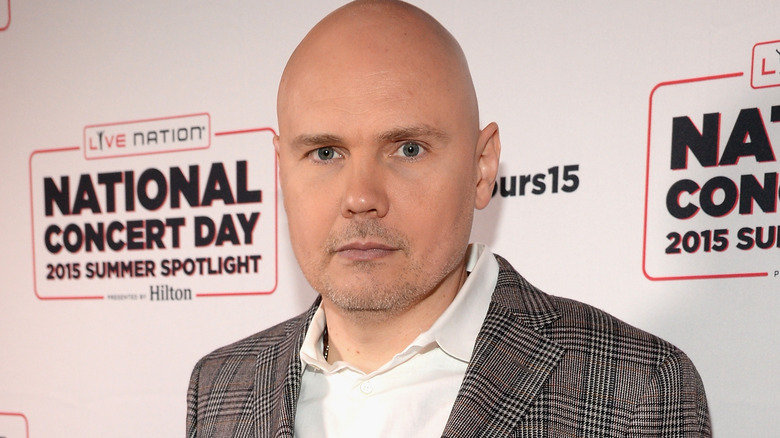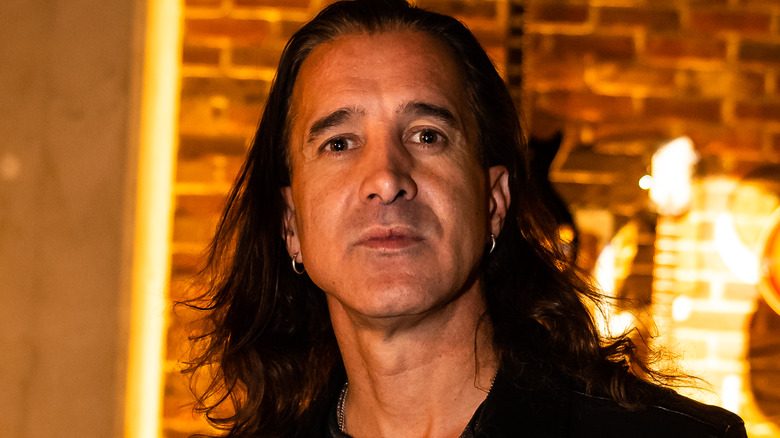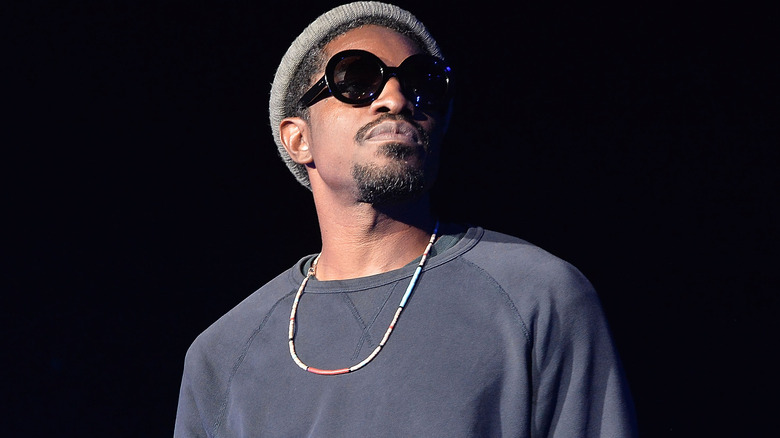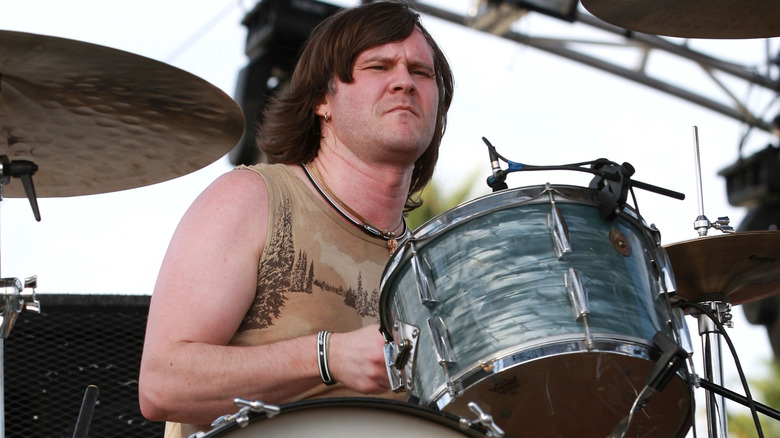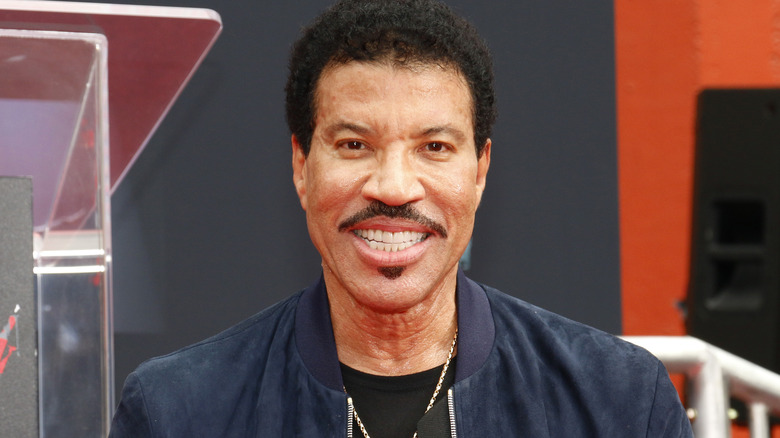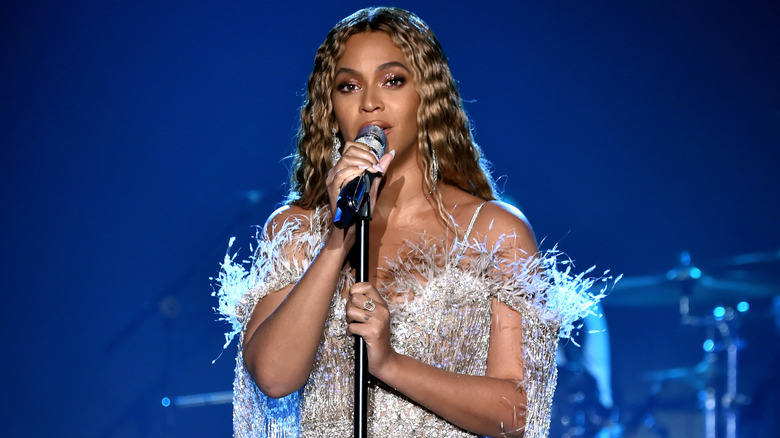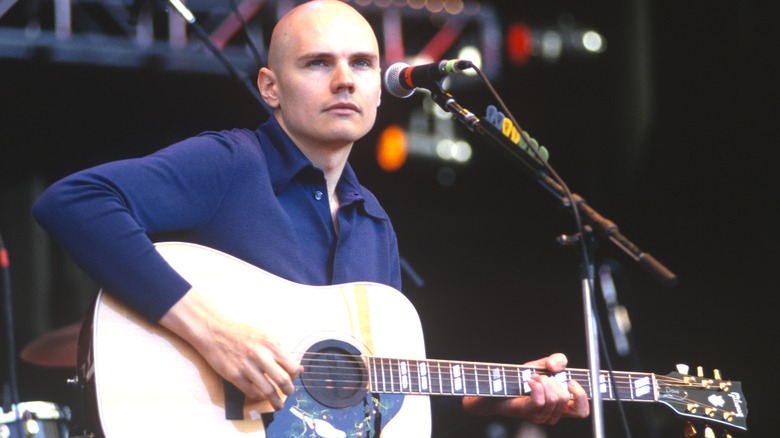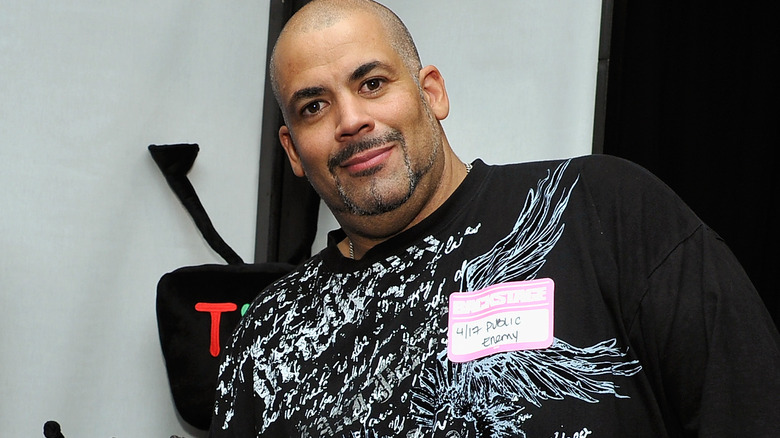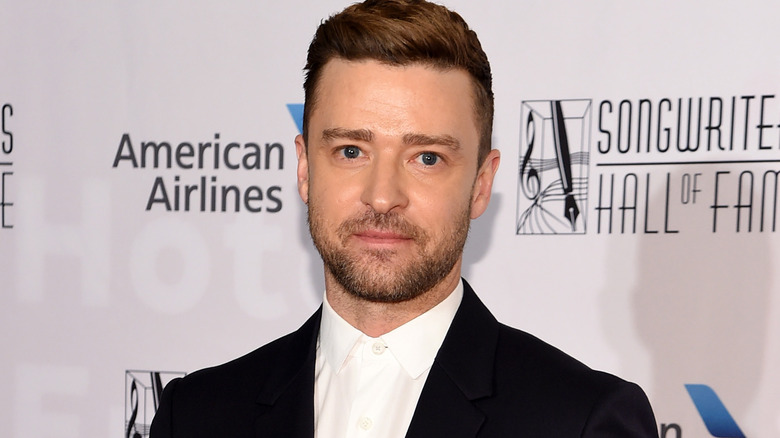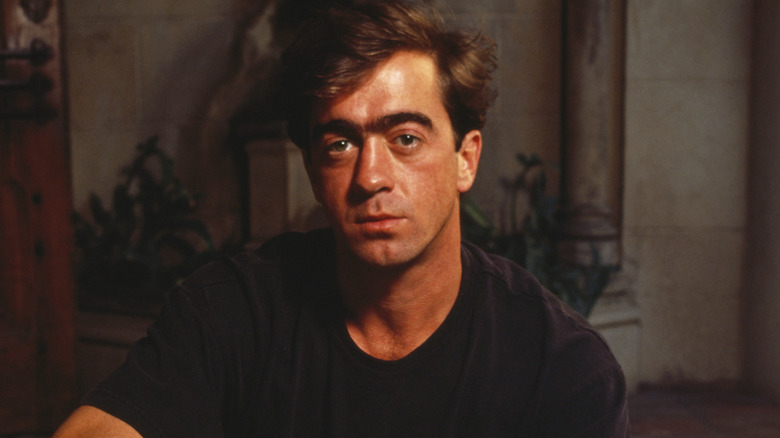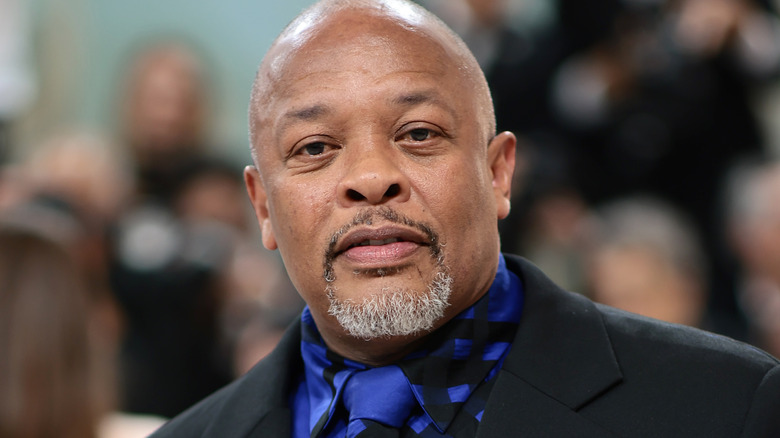Musicians Who Were Never The Same After They Left Famous Bands
A musician leaving a band is a pretty normal thing in the music world, and there could be a variety of reasons for it. Perhaps as time went on, that person's dreams changed, and doing the rock star thing was no longer on their bucket list. Or maybe the person who left just liked playing music and didn't care for all of the other things that go with being a professional musician, like dealing with the pressure of having to satisfy a record label that's thirsty for hits.
Sometimes, after a band member quits, that person makes a seamless transition into another profession, like Gwen Stefani's brother, Eric Stefani, who became an animator after leaving No Doubt. But others never seem to get over leaving their famous band, and they haven't been the same since, whether for the good or bad.
For this one, we'll delve into some of the musicians whose lives or careers were permanently affected by leaving their band and explain how everything changed for them. Some of their stories are unfortunate, others inspiring, and a few of these major life changes played out in front of our very eyes.
Scott Stapp went on a downward spiral
There are some musicians who go straight under the radar after parting from their famous band, leaving many to wonder what happened to them. But that wasn't the case with Creed's former frontman, Scott Stapp, because he often made headlines after the group's 2004 split, and it wasn't for his music. The Florida native got into a fight with members of Nebraska band 311 at a Baltimore hotel in 2005, for example. Vocalist Doug "S.A." Martinez of 311 spoke to Rolling Stone about the brawl, saying it started after Stapp insulted his wife. Then in 2006, the "My Sacrifice" singer fell off a hotel balcony in Miami while high on drugs and alcohol. He was later found by Atlanta rapper T.I., of all people.
Stapp then landed in the news again in 2006, when it was reported that he appeared in a sex tape with Kid Rock and some exotic dancers that was filmed several years prior. He was arrested that same year for intoxication as well, one day after getting married. Plus, the rocker was booked in 2007 in Florida for domestic violence. Stapp faced some financial problems to boot, which he revealed in a now-deleted Facebook video. "I had no money, not even for gas or food. I went two days without eating because I had no money," he explained in 2014 (via CBS News).
Andre 3000 struggled to make music after the success of OutKast
At one time, André 3000 seemed to be a creative machine, pumping out one stellar rap verse after another — whether on songs with his OutKast partner Big Boi or in his solo work. But later, André pretty much stopped making new music, which had a multilayered effect. For one, he and Big Boi must've lost big-time money due to not touring. Atlanta rapper Big Gipp, who's in the Dungeon Family rap collective with OutKast, estimated in a 2023 interview with VladTV that they could've lost up to $100 million by turning down shows.
Two, it could be said that before slowing down on music, André was shaping up to have a near-perfect musical legacy since many consider him to be one of the best rappers to ever hold a microphone. In 2023, however, he seems to be more associated with shying away from music and being a recluse. OutKast's last album was 2006's "Idlewild," and besides going on a 20th-anniversary reunion tour in 2014 — which André told Fader magazine made him feel like a "sellout" — he hasn't toured at all.
Then in a 2019 interview on Rick Rubin's "Broken Record" podcast, André explained that OutKast's success may have affected his ability to write new songs. He also relayed something similar to Complex in 2017, saying music has become just a "hobby" for him. But André did deliver a new verse on rapper Killer Mike's 2023 cut "Scientists and Engineers," so there's hope.
William Goldsmith held on to his hurt
Imagine this: You're invited to be in a band by a former member of Nirvana, of all people. It happened to drummer William Goldsmith when he joined the Foo Fighters in 1994 after being asked by Dave Grohl. On the surface, it may have looked like a sweet opportunity for Goldsmith, but it turned out to be a sour one that drove him to use drugs and alcohol to cope. The experience seemed to forever change him, since he was still venting about it decades later.
See, Grohl isn't just the charming, comedic Foo Fighters frontman; he's also considered to be one of rock's greatest drummers. So when the band recorded their 1997 album "The Colour and the Shape," he re-recorded most of Goldsmith's drum parts. That led to Goldsmith quitting the band in 1997, something that he discussed with the Daily Mail 20 years later. "When you put that much of yourself into something, and then without you even knowing, it is completely destroyed from existence," he said in part.
Grohl gave his side of the story to Vulture in 2021 and expressed regret, saying that he should've let Goldsmith know he was redoing the drums a lot sooner than he did. As of this writing, there's no indication that Goldsmith has fully forgiven Grohl.
Lionel Richie soared into the stratosphere
It's a classic story. A group of people form a band, and at first, everyone enjoys the same level of popularity. As time goes on, however, one person gets way more attention, and resentment sets in. Lionel Richie knows what that feels like, since he was a standout member of the Commodores before leaving. "It was so difficult, from a press point of view," he said on "Jimmy Kimmel Live!" in 2018. "The press kept saying terrible things like, 'What's a guy like Lionel Richie doing in a band like the Commodores?' ... Try to go back to a rehearsal after that."
Richie said that tensions were so high in the band due to his popularity that everyone took a break to cool off. But after he released hits like 1981's "Endless Love" and 1983's "All Night Long," his solo career exploded, and he never returned to the Commodores.
Richie's life and career were never the same after that, as he won four Grammy awards, has five No. 1 Billboard hits, and continued to have crossover success. And think about this: The last album he recorded with the Commodores was 1981's "In the Pocket," and he's still incredibly relevant in 2023. That has a lot to do with being a judge on American Idol since 2018 and having a busy tour schedule. So in all, it looks like Richie made the right decision by making that hiatus with the Commodores permanent.
Beyoncé found her true destiny
When Destiny's Child first hit in the late '90s, it was easy for Beyoncé to become the most popular member since she usually sang lead vocals. That, of course, meant she was given more camera time in videos, which led to a higher profile. So, it probably wasn't a surprise when the Texas-raised artist went solo and released her debut album "Dangerously in Love" in 2003. To say that Beyoncé was never the same after leaving Destiny's Child wouldn't do her successful career justice. In short, she went from being a popular singer in a sea of all-girl groups to a cultural icon. How many vocalists can say that?
Some of her accomplishments include having eight No. 1 Billboard hits and 21 top-ten singles. In comparison, she had four No. 1 hits with Destiny's Child. Beyoncé also has a whopping 32 Grammy wins. On top of that, she isn't doing too shabby on the financial side of things; in 2023, Forbes reported that her net worth is a cool $540 million.
But there's also Bey's level of fame to consider since being out of Destiny's Child. In 2023, she can easily be called one of the most famous women in the world. Plus, just like Aretha Franklin and Tina Turner before her, she's transcended music and become a fixture of pop culture. She married superstar rapper Jay-Z in 2008, which only added to her level of celebrity.
Billy Corgan's solo career wasn't a huge success
Imagine the looks on the faces of Smashing Pumpkins fans in May 2000 when founding member Billy Corgan told Los Angeles radio station KROQ that the band was parting ways because they had expended all they had as a four-person unit, per Rolling Stone.With Corgan being the band's front person and best-known member, one could reasonably assume his life would have been altered in a positive way, at least musically. But that wasn't the case. In actuality, it could be said that his career took a downturn afterward.
Five years after the band split, Corgan released his first solo album, "TheFutureEmbrace," to tepid reviews. To add, Nielsen SoundScan said it moved just 69,000 units upon its U.S. release, according to Today. It didn't take long for Corgan to reassemble Smashing Pumpkins after that, which he did in 2005. But despite the new iteration of the band and releasing more solo material, he never seemed to reach the same level of acclaim as the '90s Pumpkins.
The Midwestern singer spoke about the original lineup with Howard Stern in 2023 and said he only felt criticism then, not the praise, saying, "Maybe there was a lot of praise, but I didn't hear it because when you're in that mindset, you just hear the criticism." That could be another reason why Smashing Pumpkins broke up.
Neyla Pekarek went back to her roots
The sing-songy "Ho Hey," the triumphant-sounding "Stubborn Love," and the heartbreaking story of "Cleopatra" — those are just some of the popular songs from folk-rock band the Lumineers. Cellist Neyla Pekarek can be seen in the videos to all of those songs, which makes sense considering she was a full-time touring member. Notice we said "was," because Pekarek left the band in 2018, and her life forever shifted. But she didn't go on a downward spiral like Scott Stapp or have a quick ascension like Beyoncé. Instead, Pekarek went back to her roots by heading to her home state of Colorado and getting back to her first love: theater.
She released her debut solo album "Rattlesnake" in 2019 and wrote a musical titled "Rattlesnake Kate," which played at the Denver Center for the Performing Arts in 2022. So basically, Pekarek went from being in a major, globally recognized band that played to ridiculously large crowds to finding a creative space that's a much better fit.
"I've always been a super-nerd," she told Westword in 2018. "Even in my introduction to the Lumineers, I had listened to so little mainstream music at that point in my life. I was really into musical theater and vocal jazz and things that weren't necessarily cool. I've definitely felt like an impostor most of the time. Where I feel best is when I'm around a bunch of theater nerds or other weirdos like me."
Terminator X left Public Enemy to raise ostriches
When most people think of New York rap group Public Enemy, they probably envision the deep-voiced leader, Chuck D, or the group's comic relief, Flavor Flav. But there's another guy who helped give the beloved band its look and sound: its D.J. Norman Rogers, otherwise known as Terminator X. He left Public Enemy in 1998 and got away from rap music completely. From there, X took a job that couldn't be further away from the hip-hop world: He began running a North Carolina ostrich farm.
"I left the music business because I was fed up with the greed and cutthroat environment that it is; this includes Public Enemy," X told the site Crazy Hood in 2014, (via AllHipHop). "That is not an environment I choose to be in. My family started an ostrich farm, which I participated in, but it is not the reason I left the music business."
But X came back to music when he began working at RapStation, a hip-hop website owned by Chuck D. Still, X's life in 2023 seems vastly different compared to when Public Enemy was in their heyday in the '80s and '90s. At that time, he was highly associated with rap publications and the mainstream music scene. But after leaving the political rap group, he was highly associated with ostriches.
Justin Timberlake became a bigger star
Even the world's biggest pessimist probably wouldn't say that Justin Timberlake leaving his band NSYNC in 2002 was a bad idea. His first TV performance as a solo artist came at the 2002 MTV Video Music Awards, and the former Mouseketeer proved he could hold his own without his bandmates. But even with the solid performance, most people probably couldn't have anticipated the success Timberlake would have in his solo career.
First off, his debut album "Justified" sold 439,000 copies in the first seven days of its release, according to BBC News. He also has five No. 1 Billboard hits and 19 top-ten singles as a solo act. NSYNC, meanwhile, had just one No. 1 hit and six top-tens.
But it's not just music — Timberlake also carved out a super successful acting career for himself, appearing in films like "The Social Network," "Friends with Benefits," and "Trouble with the Curve." Plus, in 2019, Forbes reported that his net worth was just north of $57 million. As to why he left NSYNC, it partially had to do with having other musical ambitions. "I felt like I cared more about the music than some of the other people in the group, and I felt like I had other music I wanted to make and that I needed to follow my heart," Timberlake told The Hollywood Reporter, per Yahoo!.
Bill Berry went from the stage to bailing hay
Not all rock stars are extroverts who draw energy from crowds and noisy concerts. Some probably got into their band because they loved playing music with friends, only to find they had a serious career on their hands and couldn't avoid the spotlight. But here's one way it can be avoided: Just step out of it. That's what former R.E.M. drummer Bill Berry did in 1997, two years after he had a ruptured brain aneurysm on stage.
He released a statement about why he left that was shared by Rolling Stone, saying his priorities had changed since joining the band 17 years prior, and he was anxious to start a new chapter. So what did Berry do in his new life? He became a hay farmer in — where else? — Farmington, Georgia.
Berry's life changed dramatically after that, since he stayed away from everything R.E.M. and immersed himself in family life. In fact, he told the Athens Banner-Herald in 2007 that the only music he was making was with his then-4-year-old son with toy instruments. Berry gave that interview via email, and reportedly, it was his first exchange with the press in pretty much a decade. But he eventually returned to the music scene by becoming a member of The Bad Ends, telling The Big Takeover in 2023 that he hadn't worked on a record in 20 years before joining (though he still insists that touring is "out of the question").
Dr. Dre had multiple career changes
What sets Dr. Dre apart from others on this list is that he's had three major career changes. Dre first made a name for himself in the group World Class Wreckin' Cru, known for songs like "Turn Off the Lights." He eventually left that group after their second album, "Rapped in Romance," was released in 1986, and he never looked back. He later co-founded the group N.W.A., drastically changing his sound as well as his image.
Gone were the sequined suits that he wore in World Class Wreckin' Cru, and there were no more romantic ballads. Instead, as a member of N.W.A., Dre took on an outlaw image and wore all black. Musically, N.W.A. delivered a brash, in-your-face style of rap music that made Dre a legend. But that wouldn't be the only time that he had a major career and life shift. He left N.W.A. in 1992 after noticing that manager Jerry Heller was favoring N.W.A. member Eazy-E. So, Dre started Death Row Records with Suge Knight and launched the career of a little-known rapper named Snoop Dogg.
Dre's third and biggest change came when he left Death Row in 1996 after having business differences with Knight. He started a new label called Aftermath Entertainment and signed rapper Eminem. Dre also launched an audio products company called Beats with music exec Jimmy Iovine, which was later acquired by Apple for a reported $3 billion.
